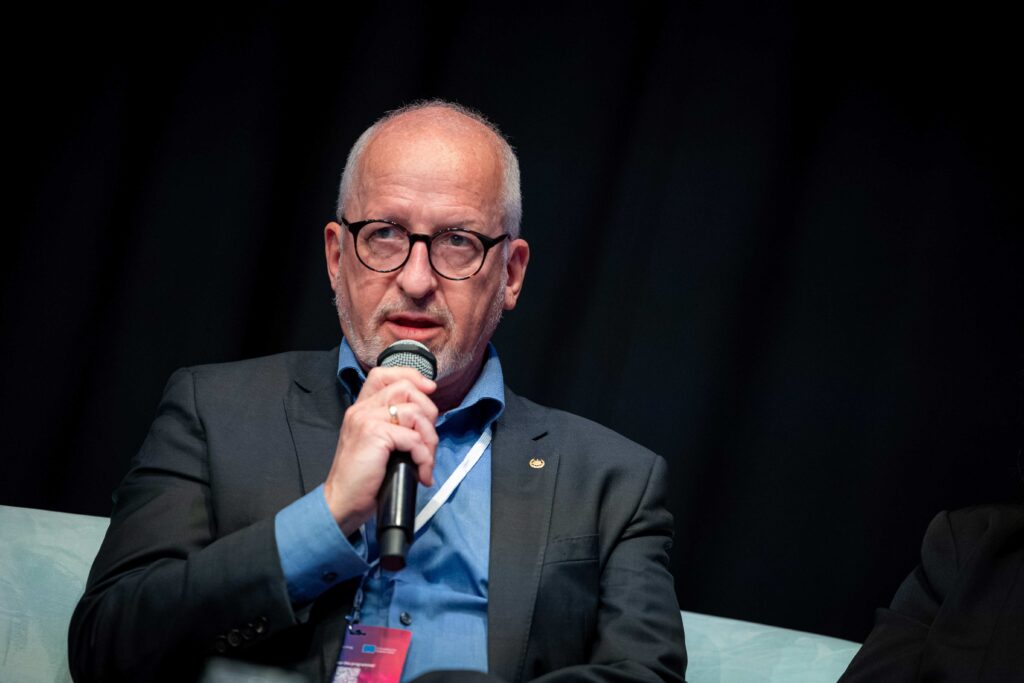“The future of a competitive European manufacturing industry hinges on one thing – skills”
“The future of a competitive European manufacturing industry hinges on one thing – skills”, says Johan Stahre, Professor of Production Systems at Chalmers University of Technology in Sweden and founding member of EIT Manufacturing.
You simply cannot scale innovation without the right skills.
Johan Stahre, Professor of Production Systems at Chalmers University of Technology
In a fiercely competitive and rapidly changing global landscape, the ability to upskill Europe’s workforce is not just important – it is a matter of survival.
EIT Manufacturing was established to bridge the gap between knowledge creation and industrial application. One significant achievement of the organisation is the EIT Deep Tech Talent Initiative, which surpassed the European Commission’s expectations by training one million people in just two years – a full year ahead of original plans. The success exposed existing urgent needs for comprehensive, continuous education in Europe. It provides both new entrants and experienced workers with deep tech skills needed for an increasingly digitised and globally competitive industrial landscape.
Professor Stahre emphasises the demographic reality that we cannot ignore. Europe is an aging part of the world, while countries like India, with young, ambitious and increasingly well-educated populations, are emerging as powerful competitors. To remain competitive, a 55-year-old European engineer must match the skills and agility of a 25-year-old graduate from India. “We have to compete and collaborate with them in the same markets, with similar products – then we need similar skills,” he stresses.

Johan Stahre, Professor of Production Systems at Chalmers University of Technology, at InnoHive 2025. Photo credit (c) Xavier Lejeune
This reality is driving new EU initiatives like the Union of Skills, seeking to build holistic skills ecosystems across Europe – securing base education as well as upskilling capabilities and making qualifications portable across European borders.
The challenge of upskilling: Fear, motivation and middle management
Achieving this ambition, however, is far from straightforward. Stahre identifies some deeply rooted challenges.
First, there may be individual anxiety. Workers, particularly those with decades of experience in traditional manufacturing roles, can feel challenged by rapidly emerging technologies like artificial intelligence (AI) and advanced robotics. “Learning new things takes time,” says Stahre, “and if you haven’t continuously exercised your training muscles, it can be daunting.”
Second, the business structure itself can impede progress. While top management may recognise the strategic need for upskilling, middle management, responsible for day-to-day operations, sometimes resists. “Who will do the work while employees are away training?” is a common concern. Middle management may also fear personally that newly trained staff might outpace them through new training.
Critical role of AI
One convenient solution for professional learners is modular education. Instead of daunting three-month university courses, EIT Manufacturing and national initiatives like Sweden’s “Engineer 4.0” programme offer compact, intensive training modules. These are one university credit per module, equalling around one week of education. Workers can realistically complete several modules alongside their jobs.
Additionally, AI can play an increasingly critical role here. Skills assessment and skills-matching has historically been a time-consuming, manual process. But, with AI-driven skills mapping and gap analysis, companies and individuals can identify precise training needs much faster and match workers with the right opportunities. This breakthrough could make widespread reskilling achievable at scale.
However, Stahre stresses that much better collaboration between universities and industry is needed. Today, they often operate in separate silos, with little direct interaction after a student graduates. New models, like the Chalmers Upskilling Academy, are building seamless connections between company learning management systems and university offerings, creating an ongoing exchange of skills and knowledge.
Financial realities: Who pays for upskilling?
Training is essential, but also expensive. For small and medium-sized enterprises (SMEs), which make up over 90% of Europe’s companies, losing even a few workers to training programmes for a week can be a very real challenge. Meanwhile, financial support mechanisms are inconsistent and fragmented across Europe. “There is an ongoing argument about who should pay: the government, the company, or the individual,” says Stahre.
Without clear, harmonised policies and incentives, progress risks being slow and uneven across Europe – especially in regions where SMEs dominate the industrial landscape.
Johan Stahre, Professor of Production Systems at Chalmers University of Technology
He notes the political complexities involved: education departments frequently view upskilling as an industrial issue, while industry ministries, on the other hand, see it as an educational one. “The responsibility gap must be closed,” he says. “Otherwise, the workforce will fall through it.”
Rethinking manufacturing
Beyond skills, Professor Stahre emphasises that Europe must rethink manufacturing as a cornerstone of strategic autonomy. Supply chains have become vulnerable and access to critical materials and technologies can no longer be taken for granted. In today’s volatile geopolitical environment, manufacturing capability is a matter of national and continental survival. “It’s not just about the EU Green Deal or climate goals anymore,” he says. “It’s about the ability to produce what we need ourselves – from ventilators to semiconductors. Without strong manufacturing, we are exposed and dependent.”
He argues for a new framing: “Manufacturing for society – not just for profit, but for resilience, security and prosperity.” In this view, upskilling is not just a private good for companies but a public good for Europe’s future. The good news? Europe still has a vibrant industrial base – 30 million people work in manufacturing across 2.2 million companies (Eurostat). With the right upskilling strategy, this foundation can be expanded and renewed.

